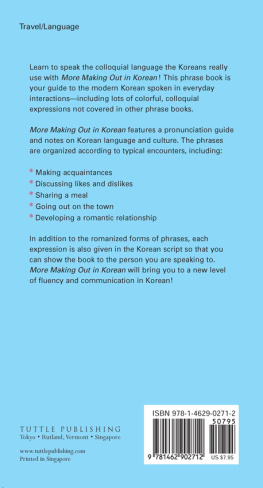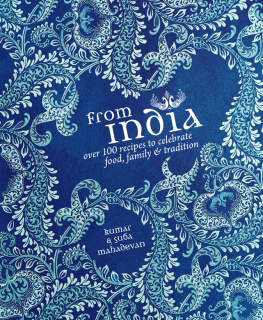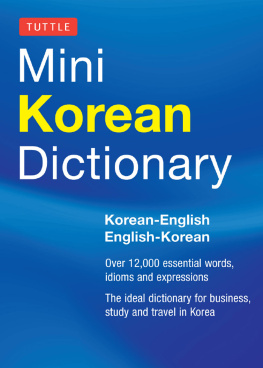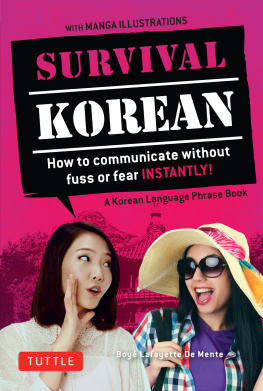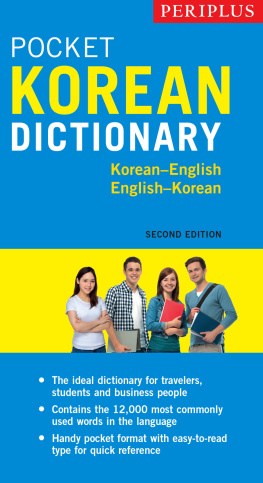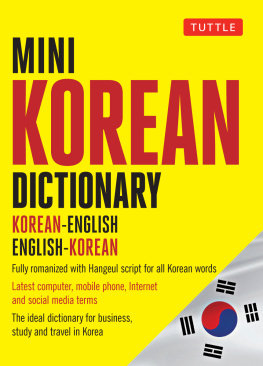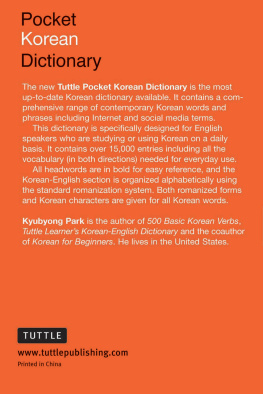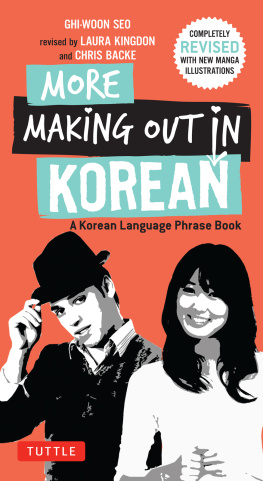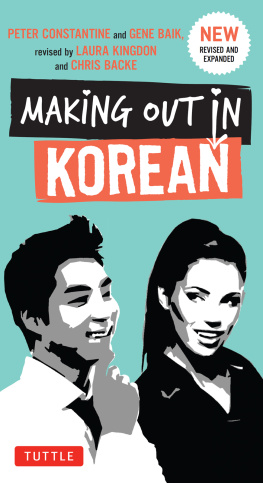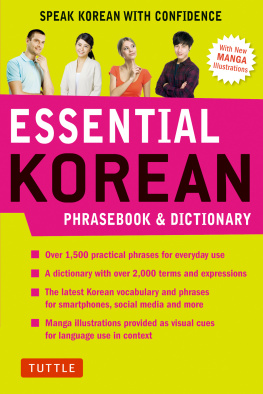Dear Reader: In order to view all colored text and non-English text accurately, please ensure that the PUBLISHER DEFAULTS SETTING on your reading device is switched to ON. This will allow you to view all non-English characters and colored text in this book. Tuttle Publishing
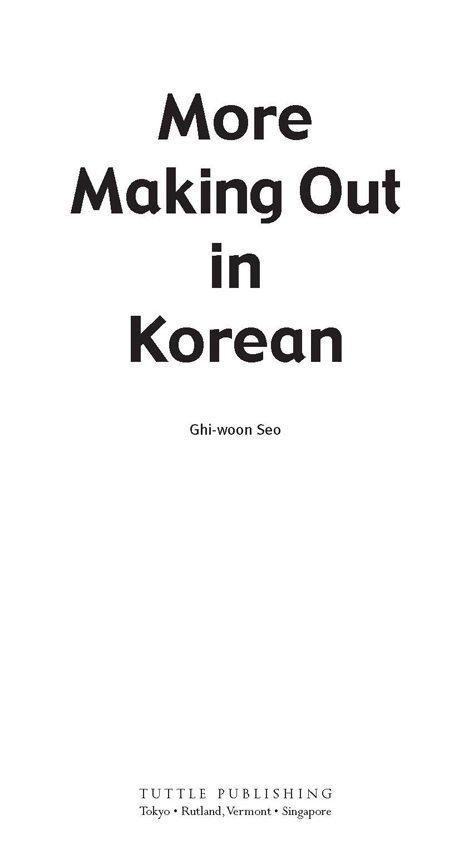
Published by Tuttle Publishing, an imprint of Periplus Editions (HK) Ltd., with editorial offices at 364 Innovation Drive, North Clarendon, Vermont 05759 U.S.A. and at 61 Tai Seng Avenue #02-12, Singapore 534167.
Copyright 2008 Periplus Editions (HK) Ltd
All rights reserved. No part of this publication may be reproduced or utilized in any form or by any means, electronic or mechanical, including photocopying, recording, or by any information storage and retrieval system, without prior written permission from the publisher.
Library of Congress Cataloging-in-Publication Data
Seo, Ghi-woon.
More making out in Korean / Ghi-woon Seo. -- 1st ed.
p. cm.
ISBN: 978-1-4629-0271-2 (ebook)
1. Korean language--Conversation and phrase books--English. I. Title.
PL913.S54 2008
495.783421--dc22
2008016953
Distributed by
North America, Latin America & Europe
Tuttle Publishing
364 Innovation Drive, North Clarendon,
VT 05759-9436 U.S.A.
Tel: 1 (802) 773-8930; Fax: 1 (802) 773-6993
info@tuttlepublishing.com
www.tuttlepublishing.com
Asia-Pacific
Berkeley Books Pte. Ltd.
61 Tai Seng Avenue #02-12 Singapore 534167
Tel: (65) 6280-1330; Fax: (65) 6280-6290
inquiries@periplus.com.sg
www.periplus.com
First edition
11 10 09 08 5 4 3 2 1
Printed in Singapore
TUTTLE PUBLISHING is a registered trademark of
Tuttle Publishing, a division of Periplus Editions (HK) Ltd.
Contents
Introduction
Korean is considered one of the most difficult languages for Western people to learn. It reflects a different word order, alphabet (Hangeul) and culture.
If you go to a bookstore and browse the books with titles starting Learn Korean, chances are youre gonna find yourself murmuring, Is it an alphabet? It looks like pictures to me (or even Its all Greek to me), I dont think I can learn Korean, and so on.
Why dont you start with interesting, easy, familiar topics first? Imagine you are going to be visiting Korea in a week, and you dont know any Korean words or expressions yet. You need a handy but useful book, so that you can speak Korean from the first moment you land at Incheon-Seoul International Airport.
Well then, More Making Out in Korean is the book for you! Just like you would read a magazine, you can take it easy, relax, and skim through this book.
Korean has various speech styles according to the speakers age, social status, intimacy and so forth. While the book Making Out in Korean focuses on intimate speech level, the expressions in this book are based on normal speech style, which can be used with anyone from a total stranger to an intimate friend without making him/her embarrassed. Therefore, you can use the expressions without worrying that you might be considered rude. This book also includes current slang used by Korean young people especially on the Internet.
Now, lets hit the road!
One Thing You Should Keep in Mind
In English, calling the person in front of you You is not inappropriate (You are so beautiful, Do you like it? and so on). However, in Korean its different. You have to be very careful when you call a Korean Neo ( ner ) or Dangsin ( dahngseen ), meaning you. Instead, it is more appropriate (1) to omit you or (2) to use his/her name followed by -ssi , a suffix used when addressing a person (for example, John-ssi , Cheolsu-ssi ). Here is an example of each of these ways to avoid you:
(1) |
John, did [you] see it? | Geugeo bwasseoyo? (to John or a person you dont know) |
? | Gohger bwahsseryo? (Did [you] see it?) |
(2) |
Did you see it? | John-ssi, geugeo bwasseoyo? (to John) |
, ? | John-ssee, gohger bwahsseryo? (John, did [you] see it?) |
For this reasonthe importance in Korean of not using you rudelythis book mostly uses -ssi instead of using neo or dangsin .
Basic Grammar
Korean sentences use a different word order than the Subject-Verb-Object you are used to in English. Korean uses Subject-Object-Verb. The verbs are very important in Korean, and so they have the prime position as the final word of a sentence.
I am going to school. | Hak-kkyo gayo. (Statement) |
. | Hahk-kkyo gahyo. |
Literally means School go.
Verbs are so important in Korean, in fact, thatjust as long as you can still gather the meaning from the contextyou can omit any other element of the sentence, except the verb. So a verb alone can form a complete sentence.
Are you going? | Gayo? (Question) |
? | Gahyo? |
Literally means Go?
As in many languages, one sentence can actually convey several different thingsa command or a question for examplesimply based on the context and on your tone of voice:
Go to school! | Hak-kkyo gayo! (Command) |
! | Hahk-kkyo gahyo! |
Literally means School go.
Lets go to school. | Hak-kkyo gayo. (Suggestion) |
. | Hahk-kkyo gahyo. |
Literally means School go.
Going to school! (You must be joking!) | Hak-kkyo gayo! (Exclamation) |
! | Hahk-kkyo gahyo! |
Literally means School go.
Reading Korean, Using the English Alphabet
In this book, the upper line on the right of the page shows the romanized version of the phrase. Romanizing is a system of writing Korean using the letters youre used to in English. It follows Koreas official romanization system. The letters used in this romanization system must be pronounced in a specific way.
Because it can be difficult for English speakers to read romanized Korean correctly, weve also supplied a phonetic guide, in italics beneath it. This is designed to reflect the closest English equivalent to each Korean sound.
Each phrase is also shown in Korean script. So if you have a hard time making yourself understood, you can show the book to the person youre speaking with, and theyll be able to read what youre trying to say.
Simple Consonants
There are two kinds of consonants in Korean. The simple consonants are pronounced as in English.
g, k n d, t r, l m b, p s ng j ch k t p h
Double Consonants
The tensed (double) consonants are a bit more challenging. The key is to work on using your vocal muscles very strongly, but without expelling air.
English | Korean | Approximate sound in English |
kk | as in s k i, s k y |
tt | as in s t eak, s t ing |
pp |
Next page
